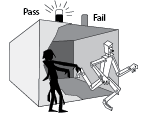No: passing the Test is not decisive
Even if a computer were to pass the Turing test, this would not justify the conclusion that it was thinking intelligently.
Ned Block, 1981.

Note: Because the issue of passing the Turing Test is closely tied with the issue of what can be inferred from external behaviour, this region of the map contains arguments that are similar to those in the "
Is the test, behaviorally or operationally construed, a legitimate intelligence test?" arguments on this map.